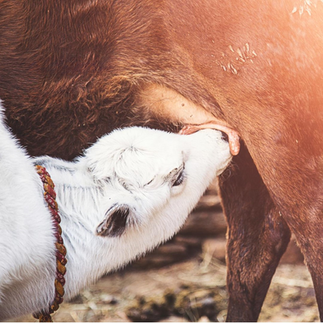The Importance of Treating Farm Animals with Respect and Compassion
- weissangie121

- Oct 7, 2024
- 6 min read
Updated: Oct 9, 2024

Celebrating International Farm Animal Day on October 2nd serves as a vital reminder of the importance of compassion and respect for the animals that contribute to our food systems and our lives. This day not only raises awareness about the plight of farm animals but also encourages people around the world to reflect on the ethical and moral responsibilities we hold towards these sentient beings.
International Farm Animal Day is an opportunity for individuals, communities, institutions, and organizations to come together and highlight the challenges that farm animals face, as well as to promote humane treatment practices. Events may take place globally, involving educational activities, campaigns, and outreach initiatives that aim to educate the public about animal welfare and inspire compassion. Celebrating this day reinforces the idea that farm animals are deserving of care, respect, and consideration, both in our everyday choices and in the policies that govern their treatment.
As we celebrate this important day, we must explore the challenges faced by farmers who raise animals, the ethical implications of their treatment, and the collective responsibility we each share in advocating for their welfare.
Understanding Farm Animal Welfare

The Ethical Perspective
Animal welfare encompasses many concerns, ranging from the living conditions for animals to the treatment they receive from humans. According to the World Organisation for Animal Health (WOAH), treating animals with respect fosters empathy and compassion in people. This foundational principle not only draws attention to how our treatment of animals can influence our character but also inspires hope by showing how it can positively shape our societal values.
When society collectively embraces compassion towards farm animals, we set a standard of empathy in our communities. This encourages individuals to reflect on their own behaviour's concerning other forms of life, promoting a culture where compassion extends beyond mere interaction to a systemic consideration of living beings, including our responsibilities toward pets, wildlife, and even fellow humans.
The Biological Perspective
From a biological standpoint, farm animals are sentient beings capable of experiencing pain and pleasure. They have social structures, form bonds with their peers, and exhibit a range of emotions. Research has shown that cows, for instance, form strong attachments to their calves and herd companions and become stressed when separated. By recognising the emotional and physical needs of farm animals, we can better understand why humane treatment is not just a moral imperative but a necessity for their well-being.
The Human Perspective
Furthermore, our treatment of animals has profound implications for human health. Studies have established a connection between animal welfare and the safety of the food supply. Cows, chickens, sheep and pigs that are treated nicely tend to experience lower stress levels, which translates to healthier meat, milk, and eggs.
In the same way, unsanitary stalls and inhumane conditions lead to the spread of disease, prompting farmers to administer high levels of antibiotics to the animals. This practice not only diminishes the quality of the produce but also jeopardizes the health of human consumers. Therefore, from both ethical and practical points of view, promoting humane treatment is vital.
I remember way back in the 1980s, an advert for Farmer Brown Chickens showed chickens walking around the farmer in the barn. They looked content, seemed like they had a good life. The slogan said, "They taste so good because they eat so good." This advert emphasized that chickens taste better when they are treated humanely and respectfully and are fed with the best feed available. It seems like marketers had insight into this concept even back in the 1980s.
The Cruel Reality of Farm Animal Exports
One of the most distressing aspects of animal welfare is the exporting of livestock methods employed in the agriculture industry. Time and again, reports have emerged highlighting the gruesome conditions that animals endure during long-distance sea transport, particularly for export purposes.
A harrowing example can be found in the Daily Maverick article, which uncovers the appalling conditions in which 19,000 cattle were transported from Cape Town to the Middle East. These animals were crammed into a ship lacking adequate sanitation, space, and basic amenities, leading to immense suffering.
Overcrowding and Stress
Overcrowding is a prevalent issue during transport. Animals are often packed into spaces that do not allow them to lie down, move, or even stand comfortably. The stress of confinement can lead to physical injuries and psychological trauma. Stress not only compromises the physical health of the animals but can also impair meat quality, making such inhumane treatment a matter of both ethics and economics.
Long-Distance Transport Legislation
While some regions have established guidelines for the humane transport of livestock, enforcement of these regulations remains inconsistent. The limited oversight allows such inhumane practices to persist. Failing to comply with animal welfare laws can have serious effects, exposing the urgent need for reform in transportation practices.
The Agriculture Sector's Responsibility and Challenges
Bridging the Legal Gap
Despite existing laws aimed at protecting farm animals, there exists a significant gap between environmental laws and enforcement that often permits animal cruelty to go unchallenged. In many countries, regulatory frameworks intended to ensure the humane treatment of animals are outdated, poorly defined, or simply unenforced.
It is crucial for stakeholders in the agriculture sector, including farmers, corporations, and policymakers, to advocate for stronger enforcement of animal welfare regulations. This includes pushing for clearer laws that define humane treatment, as well as establishing consequences for non-compliance. Furthermore, educational initiatives to empower farmers with knowledge about best practices in animal husbandry that promote farm animal welfare should be promoted.
Economic Considerations
While there may be upfront costs associated with implementing humane practices, research indicates that the long-term benefits far outweigh these initial investments. Farmers who provide humane living conditions for animals often experience reduced veterinary costs, lower mortality rates of livestock, and improved product quality which fetches a premium price.
In addition, consumers today are increasingly valuing ethical animal treatment in their purchasing decisions. This shift presents opportunities for farmers who prioritize animal welfare, positioning them to respond effectively to consumer demand for responsibly sourced products.
Benefits of Humane Treatment of Farm Animals
Adopting humane practices and principles in the treatment of farm animals can yield multiple benefits for both animals and humans. Below are some of the key advantages:
Better Animal Health
Animals that are treated with care and respect tend to be healthier. They suffer fewer illnesses, have healthier reproduction rates, and have a lower incidence of stress-related disorders. Reducing stress helps improve their quality of life, resulting in more efficient productivity and better-quality meat, milk and eggs on our tables.
Improved Meat Quality
High standards of animal welfare usually correspond to meat that contains fewer antibiotics, has balanced acidity levels, is tender and flavorful. Same goes for eggs and milk products. Such high standard of quality produce presents a great opportunity for the farmer because quality produce can lead to higher sales and a loyal customer base that values ethically sourced products. "Organic" food products are sold at a premium in supermarkets.
Positive Public Perception
As consumers become more conscientious about animal welfare, commercial farms that prioritise the humane treatment of animals, will gain respect from the public and boost their reputations. Animal producers are increasingly being held accountable through social media and public opinion, making a commitment to animal welfare an important aspect of their business practice. Farmers can set themselves apart in a competitive marketplace by adopting those practices.
Advocacy and Education
As we advocate for the humane treatment of farm animals, public awareness and education must follow. There are numerous organisations dedicated to promoting animal welfare and educating consumers and farmers alike.
Community Outreach Programs
Community outreach programs play a critical role in raising awareness about animal welfare and sharing best practices in farming. These programs offer training to farmers, equipping them with the knowledge they need to improve animal care and promote humane livestock-raising practices. Additionally, organising public talks and presentations about animal welfare can help encourage community members to make informed purchasing choices.
Engaging with Authorities
It is important to support reforms in animal welfare legislation. Whether you are an Environmental Health inspector or just an ordinary individual who is aware of the appalling conditions farm animals endure, you can communicate your concerns to authorities such as the National Council of the Society for the Prevention of Cruelty to Animals (SPCA) and urge them to investigate and provide assistance. By working with authorities and sharing information, we can encourage a collective effort towards creating a more humane farming system.
Conclusion
The humane treatment of farm animals is imperative for fostering a compassionate society. By treating farm animals with respect and compassion, we improve their lives, create a positive impact on our communities, and improve the quality of our food source. This commitment extends to promoting better animal welfare legislation, addressing the gaps in law enforcement, and encouraging education and advocacy to prevent animal cruelty.
As we celebrate International Farm Animal Day, let us remember our collective responsibility to advocate for the well-being of farm animals and to support practices that foster compassion and respect. Everyone has a role to play—consumers, farmers, and policymakers alike. When we work collectively towards the humane treatment of animals, we embrace a more ethical and compassionate worldview that benefits not only the animals but also ourselves and future generations.
How do you feel about farm animals? Do you even think of them at all? Leave a comment or a heart if you also think that we should all stand up for better treatment of farm animals. We care about your views just as much as we care about the planet.











Comments